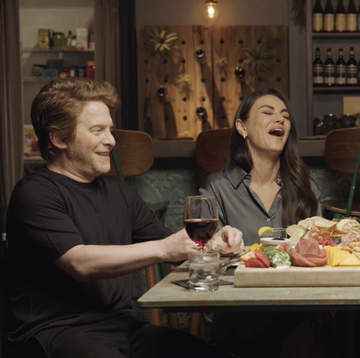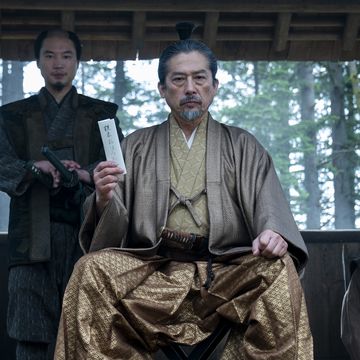Season 5, Episode 9: "Dark Shadows"
Perhaps the surest route to judging the past is through its fads, to look back on the tiniest of details and say: I can't believe we ever did that. When the events are large like, say, WWII, this judgment is called wisdom. When they are small like, say, weighing food for portion control regardless of its fat content, this judgment is called humor. Mad Men, with all its '60s era-specific references, usually leans towards the former, poking "fun" at race riots, serial rape, and prenatal chain-smoking. But this episode, unlike Betty's weight, was light on the context and heavy on the ridiculous. See also: the notion that just because cheese cubes weigh less than a grapefruit means they're probably better for you.
Anyway, in an otherwise stellar season, this episode kind of sank like a stone. A cliché I might avoid using if the advertising plot thread this time around didn't hinge on the expression "a snowball's chance in Hell." I will say that there are two quick and amazing camera shots here almost as good as the "last supper" final shot at the American Cancer Society event earlier this season. The first is the show's first aerial shot of Don sitting in his office and going through Ginsberg's ads. I believe the only other time I saw the top of Jon Hamm's head was when a couple of hitchhikers beat him up in a motel a few years ago, and he woke up passed out on the floor. The second is when Don and Sally are arguing in front of the great window of his apartment (at this point that window is like Chekhov's gun, and I will be a little sad if a meteor doesn't fly through it in the season finale). Sally insists that she's "not a little girl," and the camera agrees with her, panning back to give her 50 percent of the scene. Otherwise? This episode felt like a slightly lackluster placeholder until we can get back to the plots and people with whom we have more invested.
Unfortunately, much of this has to do with the heavy (sorry) focus on Betty. Putting aside the steady low-grade vitriol slung at January Jones by the media, Betty is simply the least compelling character. With Pete in the moral gutter like never before, Lane creeping about with his Britishness and his fetishes, Megan and Don being Megan and Don, Sally all grown up, and Roger off the rails, well, if I really want a fix of the village sociopath, I no longer need Betty. My shock threshold has been elevated, and seeing her act on her manipulative tendencies for an hour on a Sunday night is not the thrill it once was. I suspect Matthew Weiner knows this. Why else would diet-challenged Betty stress-spray whipped cream into her face after an awkward encounter with Megan? Her entire performance is headed towards pure slapstick. It is a mistake to assume Betty's fat suit is adding additional layers. It isn't. It's the only layer.
Meanwhile, the two clients on deck are Manischewitz and Sno Balls (those kid-friendly desserts). Though the former is flying under the radar, brought in by Burt Cooper himself and presented to Roger. The old guard is sick of being bullied by account-hog Pete. Let's remember who founded this agency, shall we? Now, on top of concrete indignities suffered at the hands of Pete, it turns out that Pete is the one who spoke to Victor Navasky (former editor of The Nation) for a very real New York Times Magazine article, in which fictional Pete Campbell was obviously not mentioned. Still: When did Pete become SCDP's Lorax, speaking for the trees? While Pete fantasizes about Beth seeing his name and coming into his office wearing nothing but a fur coat (a kind of Internet age media fantasy grafted onto the Mad Men environs), Roger "I gotta start carrying less cash on me" Sterling bribes Ginsberg to help him with a Manischewitz wine pitch under the table. Candidate for Best Line of this episode: "You assume that I'm Jewish." Speaking of booze and drinking it under the table, Peggy saves the day again with the other Best Line candidate: "Am I the only one who can drink and work at the same time?"
Anyway, back to Roger. One would think that being married to the most insanely hot Jewish woman ever aside from these < target="_blank">two < target="_blank">chicks would have provided some kind of knowledge about the client at hand, but as usual, Roger's general (albeit charming) laziness and lack of faith in himself trumps all. When Peggy later learns that she is not the only one being bribed by her boss, she flips out at Roger in the elevator, accusing him of having no loyalty. Huh. Why so serious, Peggs? You're normally so astute when it comes to this stuff. Is berating Roger not like the mistress being shocked that the man she's sleeping with has more than one mistress? Roger shuts her down, reminding her that she is not one of the 120 women to whom he owes something at the moment... and lamenting the lack of an "executive elevator."
Viewed solely through the prism of the male characters, who are far more compelling than the female ones this time around, this episode might as well have been titled "Old Dudes Get Sad." Don has to rifle through Ginsberg's "Shit I Gotta Do" file to see what he's up to on the Sno Balls campaign. What he's up to is mostly hating Hitler. Which is cool. But he's also onto some great ideas for the campaign, which sparks a renewed sense of competition in Don. He stays late brainstorming ideas just so that he can present them in an off-the-cuff fashion at a meeting the next day. On the plus side, Don might be the first person in SCDP history to find himself in the office at off-hours without anything tragic or creepy befalling him. On the negative side, Don purposely and pathetically leaves Ginsberg's competing pitch for the same client in the back of a taxicab.
As for Roger, everything he touches (that's not Joanie) turns into a bill. In order to get Jewish Jane to come to dinner with the Manischewitz people and perpetuate the farce that they're still married, he has to promise to buy her a new apartment. Because the one they shared is filled with emotional triggers. After the dinner, during which Jane flirts with the client's son, Roger sleeps with her in this brand-new apartment. So now what? Now he basically has to buy her another new apartment? Jesus Christ, I would have moved every hour on the hour for the past decade if, every time I had an emotional moment in my house, I had to break out the cardboard boxes and the packing tape.
Then there's Henry, who is also sad. He "bet on the wrong horse" in his political career, and his "fat-nosed" (© Don Drapper) wife makes him eat fish for dinner and nearly knocks over lamps. Betty's so big, she doesn't know the size of her own, er, car. Speaking of which, she's also a terrible backseat passenger. "Betty," Henry reminds her while they attempt to double-park, "I'm not an ambulance." True enough, Henry — you can't save her. Not from the sight of skinny Megan getting dressed, nor from a truly adoring note from Don to Megan that accidentally slips into Bobby's pile of drawings. And certainly not from the awkward Weight Watchers meetings in which Judy Schechter, that bitch, is loosing a pound a week while Betty is merely "maintaining." Damnit Judy, what's your secret? Why are your cheese cubes different from all other cheese cubes?
In the end, Betty retaliates against the nauseating evidence of Megan and Don's love and feeds into her own jealousy by just casually mentioning to Sally that Don had a wife named Anna. Stick that little nut up your family tree, Sally. This causes some commotion, but Megan pacifies it. A social genius even when unemployed and getting into spats with her actress friends, Megan sees instantly what Betty's up to. She stops Don from calling his ex-wife mid-celery-crunch and yelling at her. Doesn't he see? He's "letting [Betty] have the thrill of having poisoned us from fifty miles away." Sally overhears this conversation and once again sides with Megan against her frustrated mother. In a bit of on-the-fat-nosed symbolism (© Don Drapper), Megan later demands that Don not open their apartment window during Thanksgiving dinner because there's a smog alert, and "the air is toxic, and I don't want that in here."
Lesson learned: Never mess with a woman who can fake-cry on command.
Meanwhile, Betty's Thanksgiving meal consists of an almost minimalist plate of Thanksgivings foods reminiscent of a dish at < target="_blank">WD-50 in New York City. Can one "deconstruct" a Brussels sprout? I have no idea. No matter, Betty's Thanksgiving statement of gratitude is anything but minimalist. "I'm thankful that I have everything I want," she says, adding, "and that no one else has anything better." But this is all true-to-Betty form. Betty isn't the character everyone loves to hate anymore. She's more of an extended light joke. Devoting such real state to her is not terrible, but it's not terribly interesting, either. By now, I view her more as Don views Ginsberg (read: "I don't even think about you"). Which brings us to the remainder of the Percy Blythe Shelley poem Ginsberg quotes earlier in the episode:
Look on my works, ye mighty, and despair!
Nothing beside remains. Round the decay
Of that colossal wreck, boundless and bare,
The lone and level sands stretch far away.
An illustration of a quote from Sunday night's Mad Men, by Chris Piascik for Unlikely Words.
The Esquire Mad Men Recap with Sloane Crosley
ALL THINGS MAD MEN ON ESQUIRE.COM:
• Who the Hell Is Alexis Bledel?
• How to Own a Business Meal, the Roger Sterling Way
• Don't Let the Wife Pick Your Clothes, Mad Men Edition
• The Season 5 Preview from Stephen Marche
• The A-Z Guide to Seasons 1-4
• The Style Blog on Why Mad Men's Look Is Dead
• The Roger Sterling Diet: An Experiment in Drinking and Stairs
• Tom Junod on the Season 5 Poster, 9/11, and the Falling Man
• How to Make an Old-Fashioned Like Don Draper Makes One
• How to Wear Suits Like Jon Hamm Does (Which Is Better Than Draper)
• Elisabeth Moss (You Know, Peggy) in Her House, Not a Lot of Clothes
• EARLIER: Stephen Marche on Draper's Double Life and Class Reality
• PLUS: The 100 Best TV Shows for Men (with Mad Men)













